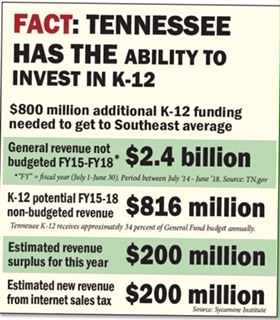The Tennessee Education Association is out with a fact sheet on school funding. The document makes clear Tennessee can certainly afford to invest more money in schools. In fact, TEA identifies more than $800 million in revenue from budget cycles dating back to 2015 that could be invested in schools. Additionally, there’s an estimated surplus of $200 million and new internet sales tax revenue of $200 million.
The bottom line: When Gov. Lee and the legislature say we can’t afford to do more for our schools, don’t believe them.
In fact, since 2010, Tennessee has actually failed to move the needle on school funding. Specifically:
To translate, in 2010 (the year before Bill Haslam became Governor), Tennessee spent an average of $8877 per student in 2016 dollars. In 2016 (the most recent data cited), that total was $8810. So, we’re effectively spending slightly less per student now than in 2010. The graph indicates that Tennessee spending per student isn’t really growing, instead it is stagnating. Further evidence can be found in noting that in 2014, Tennessee ranked 43rd in the nation in spending per student. In 2015, that ranking dropped to 44th. 2016? Still 44th.
We’re not getting the job done. The state’s Comptroller suggests we are underfunding schools by at least $500 million a year.
The analysis of available revenue by TEA makes clear Tennessee can afford to close that gap. Unfortunately, our leaders have so far lacked the political will to make that happen. Why not invest in schools? Why not use available revenue to boost opportunity for every child in our state? Why not close the funding gap?
These are the questions Tennesseans should be asking as the 111th General Assembly begins and Bill Lee assumes office.
For more on education politics and policy in Tennessee, follow @TNEdReport
Support education reporting — a one-time or monthly contribution helps make TNEdReport possible!






